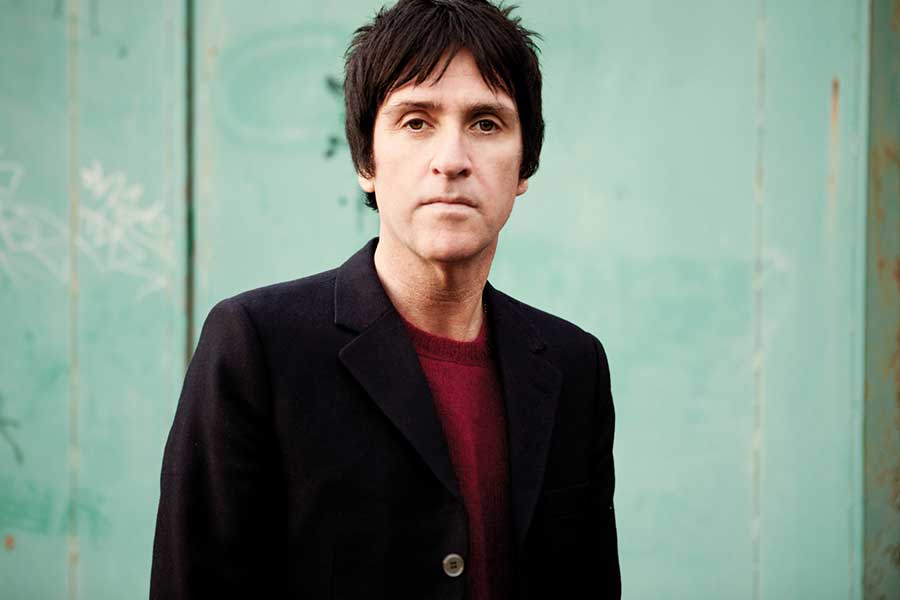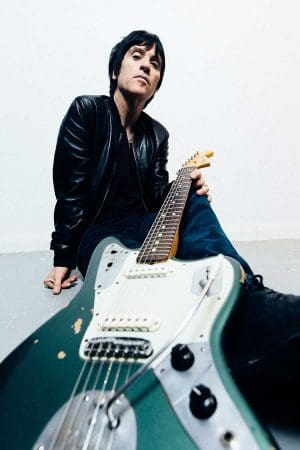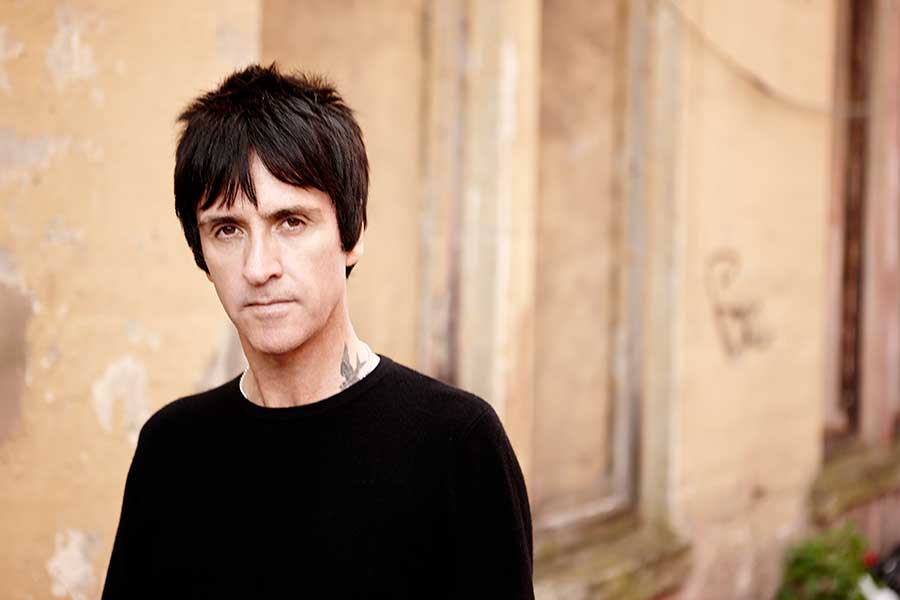
Johnny Marr, 2019. Photo by Jon Shard
In 2019, Johnny Marr talked to Classic Pop about his then-latest album Call The Comet…
A warehouse on an industrial estate just outside of Manchester isn’t the most obvious location for the genesis of a modern classic album. Johnny Marr’s recording studio nestles among the more likely suspects for an out-of-town estate.
As soon as you reach the top floor, however, the open-plan expanse so clearly belongs to Marr that it’d be rejected as too easily recognisable by Through The Keyhole.
Not only are there original billboard adverts for The Smiths singles, including That Joke Isn’t Funny Anymore and The Boy With The Thorn In His Side next to recent solo tour posters and a stack of guitars and amps, but Marr’s passion for Manchester City is on display, too, most notably a signed photo of the iconic overhead kick by Dennis Tueart which won City the League Cup final in 1976 – a then rare trophy before the team’s current well-funded glories.
It’s a day of promo for Marr, so he’s laid out a selection of vegan M&S sandwiches and cookies for visitors, who are also invited to make a cuppa from an extensive selection of teas, including from a barrel marked with a Post-It as simply “Tea – posh!”
To complete the visual clues that, yes, this is definitely Marr’s studio, the accompanying mugs include one with a cartoon likeness to one of the world’s greatest living guitarists.
- Read more: The Smiths – the complete guide
At home in the studio
Racing to complete a photo session, Marr strides past looking gloriously like that cartoon mug: high peacock hair, black fake-leather jacket, crisp white t-shirt, wide and inquisitive smile.
Having given up alcohol several years ago, “when it was just starting to get a bit much”, Marr has always looked enviably trim, a poster boy for the vegan lifestyle.
He admits that he feels a sense of responsibility to rock’n’roll to keep himself in shape. “I look the same as I’d probably do even if I wasn’t on stage,” he says with that welcoming smile. “But it’s true that everything about being a musician is a calling to me, and that includes the way musicians look.
“So there was no getting out of staying healthy for me! As well as the actual business of making music, part of a musician’s life is their identity. From a kid, I wanted all of it to be my life, and looking like it is my job. If I’d not passed the audition to be a musician, I’d have been fucked.”
Taking a mixing desk high-backed swivel chair, Marr ushers Classic Pop to the paisley-patterned sofabed where he set up home while making new album Call The Comet.

Photo by Niall Lea
He can joke about it now – “Don’t worry, I’ve had it cleaned since” – but, well… Johnny Marr has no need to be sleeping on a sofabed in an industrial estate, surely?
“My family are used to that sort of thing by now,” admits Marr, who is married to childhood sweetheart Angie. “Making this record, I was in that space where I thought that if I went home I’d lose the thread.
“One night here turned into two, which turned into a week – then I’d go home at weekends and be a little scary for everybody.
“The way my life has always been is that it’s set up to serve what I’m doing as a musician. I know I’m very fortunate that’s the case. I’d battled with my parents and teachers to earn that privilege, I was lucky that I got validated to live that lifestyle by getting people’s ear with The Smiths.”
However, he does concede the extremes of making Call The Comet left Marr and his loved ones with some concerns.
“My family assumed that I was either on to something good, or that I had gone over the edge. Truth be told, I thought I had gone over the edge. I did think I was overdoing it. But you do get pulled by something when you are making music.”
His Marr–ster’s voice
The view from Marr’s studio window is magnificently odd. A contrast from the regulation offices at the front of the building, the complex appears to look out over a metallic landscape of distorted climbing frames. Should the makers of a post-apocalyptic dystopian film want their backdrop, they should give Marr a call.
“It does get pretty intense here,” he admits. “It’s a very atmospheric building and really noisy when the wind starts blowing. Walking around the corridors here late at night, when I was on my own, I started to think I was hearing things.”
All of which might lead you to think that Marr’s third album under his own name is a bleak Nine Inch Nails-style industrial noisescape.
In fact, Call The Comet builds on the classic guitar-pop of his previous solo albums, The Messenger and Playland, to emerge as a shamanic, glittering gateway into another world; a more hopeful domain where the villains currently in charge have been vanquished.
Towards the end of his 2016 autobiography, Set The Boy Free, Marr reflects that he “identifies as a guitar player”. But, the wide-ranging drama of his voice on Call The Comet shows that Marr should now recognise his vocal prowess.
In the sweetly sung Spiral Cities, the timeless high-pitched wooh-hoo!s of lead single The Tracers and the spoken-word interlude in album centrepiece Walk Into The Sea, his voice sounds as charismatic as that famous guitar. While, on the growling My Eternal, Marr barely sounds human at all.
The transformation of Marr’s voice can be marked down to a new emotional honesty. Call The Comet is the 18th full album of his career, but it’s only his third as a singer and it has the intensity of an ingénue.
“I realised during a playback to the record label that I’ve made a singing record,” he explains. “That wasn’t my intention, but it’s to do with the emotions I felt throughout making it. To be honest, I’d previously disguised things if I was singing about myself before. I would either be tongue-in-cheek or I’d celebrate it.
“On The Messenger, the song Generate! Generate! is a tribute to hyperactivity and intensity. But on this record, Day In Day Out is about feeling vulnerable and feeling sick with my own obsession. It sounds very emotional because I’m describing being on the receiving end of my own obsessions.
“Here I am publicly ‘fessing up to a side of me that drives me mad. It’s not a particularly dramatic confession for others, but it is for me – I realise now that the song is helped if I sing with emotion, and there’s a vulnerability in doing so. I’m maybe less self-conscious now, too.”
Troubled times
There’s a sense throughout Call The Comet that Marr is pushing himself close to the edge, and he admits the album is “quite fraught – which surprises me”.
When he started the album in 2016, Marr only had Spiral Cities ready, which had been previewed live on the Playland Tour. “I was really burnt out when I finished the book,” he reveals.
“I wanted to make a record, but I hadn’t really dealt with the effects of writing and promoting my autobiography. I thought at first I might make some really fucked-up music – and I still might do that in the future.”
A firm believer in how one’s whereabouts influences the making of art, Marr gets up from his chair to demonstrate how Call The Comet should be more fucked-up than it is. He points to one wall of the studio, which had a TV playing Al-Jazeera during recording, while another wall screened “really weird French videos off YouTube” on a projector.
He confesses he nearly ditched album closer A Different Gun, inspired by the Bastille Day attack in Nice in July 2016 in which 86 people died after a truck deliberately drove into crowds.
“You can get clumsy on a subject as sensitive as that very quickly,” says Marr. “I’m writing for a British guitar group, so the result was never going to be a 17-minute opus. I thought at one point that it was too delicate, too special to put into a rock song. But then I thought: ‘You’re an artist – you’ve got to have some bottle, so find the skill to do it’.”
We will rock you
Call The Comet is a fantastic pop record, in what Marr and anyone of his generation will recognise by the term. It’s there in the appropriately catchy Bug and the startlingly sexy groove of Hey Angel. “Bug is meant to be a pop song as I understand it,” he concurs. “But my terminology might not square with the outside world.
“I use ‘rock’ to describe music I like, but I was always comfortable with using ‘pop’ to describe guitar music. At the moment, however, I’m prepared to concede that ‘pop’ means something quite different now. I want pop music to be great, but it’s been overtaken by the void squad – the vacuous, corporate world.
“There’s never been a time when I haven’t loved what pop is supposed to be, but there aren’t really any songs from the current definition of pop that I love. That’s not what I go to when I listen to music.”
That said, Marr might one day find himself with a sudden yearning for Anne-Marie or James Arthur. In New Dominions, Marr sings about feeling “hate turn to lust” and he admits that happened musically recently with Queen.
“I had a very disconcerting Queen moment,” he blushes. Normally laidback, Marr starts squirming in his seat as he recalls hearing Somebody To Love and wanting to sing along.
“I was hoping no one could see me enjoying fucking Queen. I wasn’t quite running up and down the front room, pulling Freddie Mercury moves and doing knee-slides, but…” he breaks off into a stage whisper. “…I liked Queen.”
He admits to becoming a recent Manic Street Preachers convert, too, having previously frowned on them because: “They slagged The Smiths off, so I never really liked them. That’s the problem with music sometimes, all the politics!”
Marr cheerfully confesses that during The Smiths’ heyday, he was as guilty as anyone about being a gobshite to his peers. But he recognises there’s a serious side to music’s playground politics. “I feel goaded sometimes into slagging off 80s bands,” he reasons.
“It can result in a polarisation between indie culture and the cultural snapshot of what the 80s is supposed to have been. Like all cultural stereotypes, that tells a very reductive story.
“The 80s was about a lot of very good stuff. I didn’t like Wham!’s music, but George Michael was a great person. He loved all kinds of music, and I had a few really great times with him.”
Marr is as enthusiastic about John Taylor and Gary Kemp, saying of Spandau Ballet’s guitarist: “He was really cool to me and my mate in 1981 before The Smiths started, so I always thought he was a really nice guy. Then later, when we did Red Wedge, Gary was one of the only people who wasn’t up his own arse.”
The same night as The Smiths played their first ever concert, Marr recalls that The Haçienda club, 800 metres away, hosted a reading by William S. Burroughs.
“So many amazing things like that went on in the 80s – I don’t think the decade has been given a proper appraisal, certainly in terms of its underground scene. But the music scene can get really bratty, and I’ve been just as guilty as anyone else. You go around as a young man being a bigmouth, then you meet these people and you not only like them, but you respect them.”
Hair today…
The Smiths themselves have finally seen their back catalogue start to be treated with respect for the first time since Warner Music bought their back catalogue in 1992. This resulted last year in a five-disc boxset of The Queen Is Dead, featuring unheard alternative versions as well as a live album recorded in Boston.
“Credit where it’s due, the label did a really good job with that box,” says Marr. “They’re doing that with The Smiths in general right now. It’s good to have things under control, as opposed to the way it was for many, many years. Most Smiths albums could get the same treatment as The Queen Is Dead boxset. It didn’t feel like the legacy had been plundered.
It was the right side of both quality and quantity – no one wants to hear shitty outtakes. So if the fans continue to appreciate it, why not? But it does take a little bit of my time to do it.”
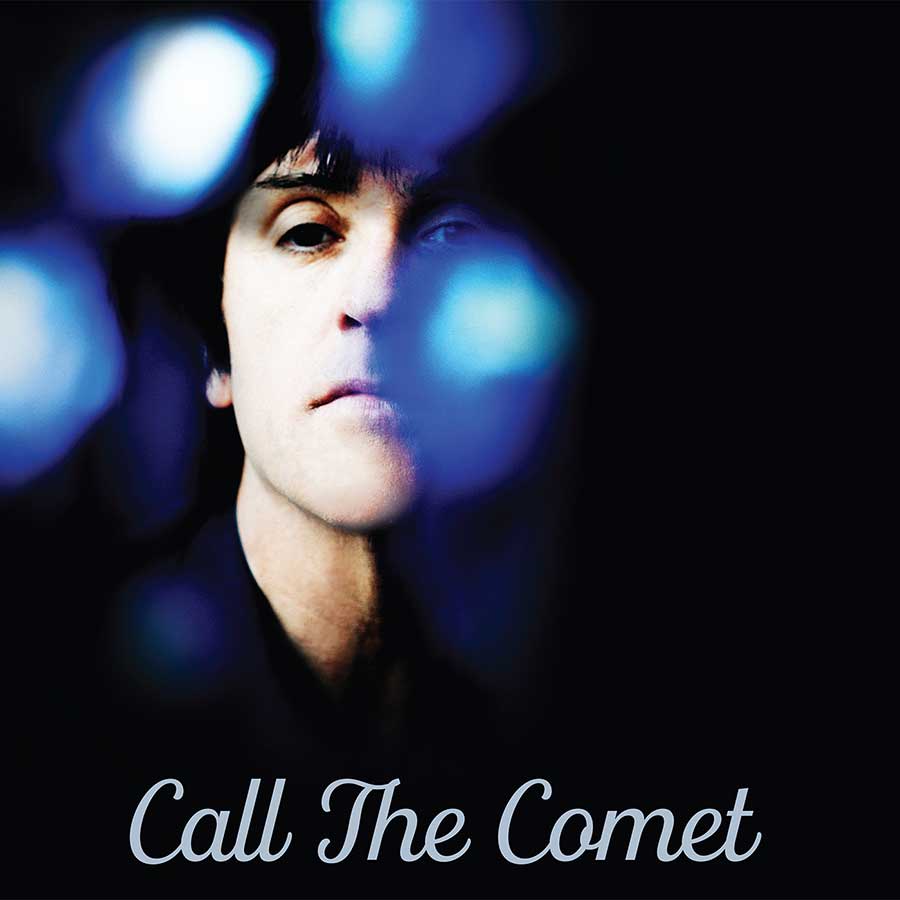
Johnny Marr Call The Comet cover
OK, then, speaking of The Smiths… In 2029, Morrissey will turn 70. If he emails the 66-year-old Johnny Marr in 11 years’ time, what will Morrissey say? Marr has the good grace to at least consider answering the question for a minute or so, before concluding: “He’s going to say: ’10 out of 10 for the hair’, but that’s obvious, that’s like everybody else.
“What he would really say, fuck knows. But 70, man. That’s not that far off.”
It’s easy to see the 70-year-old Johnny Marr about to release his ninth solo album, still with perfect hair.
“I want to imagine that I’m always going to be better at something,” he says. “Hopefully, as an old guy, I’ll still be writing really good lyrics and playing emotive guitar music that connects with people.”
Taking the plunge
“I do have a sense of including the audience in songs, whoever wants to be in that audience. I tend to err on using the plural in songs, of saying “we”, for that reason.
I like the idea of me and the audience being on the same trip. The audience have let me know they’re really behind me and understand me, which I really wasn’t banking on when I first went solo.
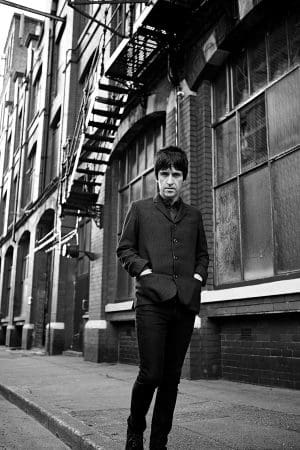
“Me becoming the frontman wasn’t that I wanted to be stood centre-stage, being adored. It was about writing songs and not wanting any other guy or girl to sing them.”
On the new album, Marr’s spirit of wanting to take his audience with him to explore what else life has to offer is encapsulated in the stunning Walk Into The Sea, a six-minute slice of hypnotism which recounts the true story of a clifftop walk Marr took in which he eventually walked down the other side of the cliff and into the sea.
“I went plunging into the water, crossing my fingers to see if I could come out the other side,” he recalls.
“It’s about rebirth, as high-faluting as that might sound. If it does sound precious? So fucking what. It’s true.”
Having fretted that he’d have no choice but to make a wildly experimental album before finding the golden thread of Call The Comet, Marr seems to be actively embracing the prospect of a more avant-garde style for album four.
“I didn’t want the solo trajectory to veer off too wildly at this point,” he says. “This one is in line with the first two, but it’s still a big leap. I’m interested to see what happens in my performance now, and that will be led by the audience.
“Going out on tour for 18 months will give me a different energy for the next record. I’m just trying to see where the audience want me to go.”
The one thing you can guarantee about that next move is that Johnny Marr can face the future without any need to cross his fingers as he plunges valiantly on. In the meantime, dive right into Call The Comet. The water’s lovely.
- Read more: Johnny Marr Fever Dreams interview
- Want more from Classic Pop magazine? Get a free digital issue when you sign up to our newsletter!
Classic Pop may earn commission from the links on this page, but we only feature products we think you will enjoy.

